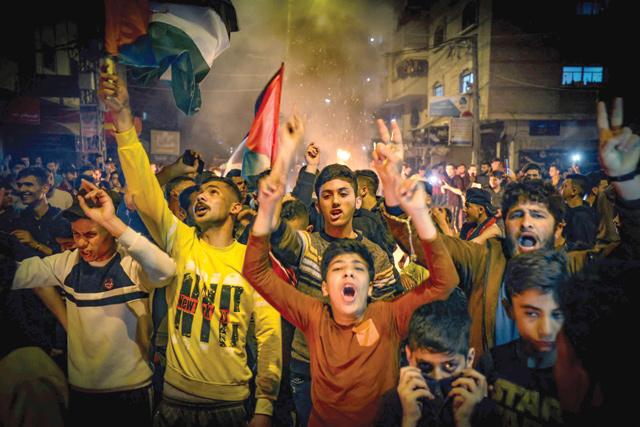- International News
- Sun-2021-04-25 | 02:57 pm

Nayrouz News Agency :
Israeli warplanes struck the Gaza Strip early Saturday after repeated salvos of rocket fire into Israel followed a second night of clashes between Palestinians and occupation forces in Israeli-occupied East Jerusalem.
Thirty-six rockets were launched, the Israeli forces said, the most in a single night this year, after Gaza's Islamist rulers Hamas voiced support for the East Jerusalem protests, which were fuelled by a Thursday march by far-right Jews.
Washington said it was "deeply concerned" by the escalating violence, while the European Union appealed for restraint.
The United States, which has taken a more even-handed approach to the Israeli-Palestinian conflict since President Joe Biden took office in January urged "calm and unity".
"The rhetoric of extremist protesters chanting hateful and violent slogans must be firmly rejected," State Department spokesman Ned Price tweeted.
Tensions have been running high in East Jerusalem over a ban on gatherings, and a series of videos posted online showing young Arabs attacking ultra-Orthodox Jews, and Jewish extremists taking to the streets to bully Arabs.
On Thursday, at least 125 people were injured when Palestinian protesters, angered by chants of "death to Arabs” from far-right Jewish demonstrators, clashed repeatedly with police.
‘Playing with fire’
Skirmishes broke out again on Friday when tens of thousands of Muslim worshippers left the city’s revered Al Aqsa Mosque Compound after night prayers and found themselves confronted by dozens of armed police, some on horseback.
Protesters hurled water bottles at police, who fired stun grenades to disperse the crowd.
Hundreds of Palestinians also gathered at the Qalandiya checkpoint between Jerusalem and the occupied West Bank, police said.
In the West Bank town of Bethlehem, Palestinians threw stones and petrol bombs towards the tomb of biblical matriarch Rachel, a shrine venerated by Jews and Muslims.
There have been nightly disturbances in east Jerusalem since the start of Ramadan on April 13, amid Palestinian anger over police blocking off access to the promenade around the walls of the Old City, a popular gathering place after the end of the daytime Ramadan fast.
Thursday’s march into the heart of Arab East Jerusalem by hundreds of supporters of far-right Jewish nationalist group Lehava added fuel to the fire.
Jerusalem Mayor Moshe Lion told public radio he was in talks with Palestinian community leaders in East Jerusalem "to end this pointless violence”.
Lion said he had tried to cancel the Lehava march, but police told him it was legal and noted that "dozens” of Jews who attacked Arabs had been arrested in the past two weeks.
The office of Palestinian President Mahmoud Abbas condemned "the growing incitement by extremist far-right Israeli settler groups advocating for the killing of Arabs”.
In a statement on the Palestinians’ official Wafa news agency, it urged the international community to intervene to protect Palestinians.
The UN special coordinator for Middle East peace, Tor Wennesland, called on all sides to "exercise maximum restraint and avoid further escalation”.
"The provocative acts across Jerusalem must cease,” he said.
Hamas’ military wing, the Ezzedine Al Qassam Brigades, voiced support for the East Jerusalem protesters.
"The spark you light today will be the wick of the explosion to come in the face of the enemy,” it said in a statement.
An alliance of Palestinian militant groups, including Hamas and its smaller ally Islamic Jihad, issued a statement warning we "cannot remain silent” in the face of the violence.
Militants in Gaza fired a first salvo of three rockets at Israel shortly before midnight (2100 GMT) Friday, the military said.
The Israeli forces said later that all 36 rockets fired were intercepted or hit open ground.
Israeli tanks shelled Gaza in response but the reprisals were met with a new volley of a dozen rockets, prompting the launch of air strikes against suspected launch sites operated by Hamas, it added.
"Fighter jets and attack helicopters struck a number of Hamas military targets in the Gaza Strip,” including underground infrastructure and rocket launchers, it said.













